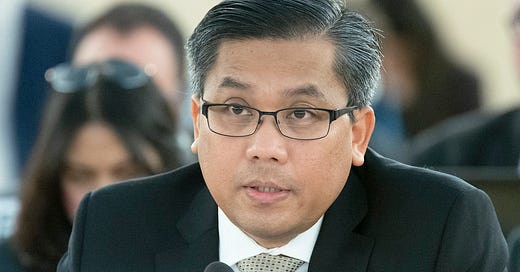What to make of the US-China deal on Myanmar's UN seat?
A rare agreement between two key powers that maintains an awkward status quo.
On 13 September, Foreign Policy, in an exclusive report, revealed that the US and China had brokered a deal between them to defer a decision on who would occupy Myanmar’s seat at the UN – the junta or the National Unity Government (NUG) – to November.
This comes a day before the UN General Assembly (UNGA) convenes for its 76th session in New York.
Why are US and China making a deal on Myanmar? Because both sit on the UNGA Credentials Committee (UNGA-CC), which has the mandate to decide country representation at the world body. The nine-member committee also includes Russia, which has reportedly “informally endorsed” the deal — along with the EU and ASEAN. Rare convergence of interests.
The deal entails two key points:
The UNGA-CC will defer its decision on Myanmar’s UN representation to November. This means that the sitting representative, Ambassador Kyaw Moe Tun (who technically represents the deposed civilian government) will continue to hold the seat for now;
In return, Ambassador Kyaw Moe Tun is expected to “hold his tongue” and “keep a low profile” during the UNGA session. This basically means he can’t give speeches denouncing the military junta or raise the anti-coup three-finger salute, like he famously did in February.
This is a bit like two parties reaching an out-of-court settlement to prevent the case from going to trial.
The brass tacks of this is that the military junta remains starved of an UN seat till at least November, which in turn, deprives it of the crucial international recognition it so desperately needs. More importantly, a high-level diplomat who has openly dissented against the coup regime and expressed his firm support for the pro-democracy movement will continue to hold Myanmar’s seat at the UN. That’s good news.
The major flipside of the deal is the gag order on Ambassador Kyaw Moe Tun, who won’t be able to take to the iconic UNGA podium to speak up against the coup back home. Whether he attends the session or makes generic comments remains to be seen.
The other flipside is the fact that the NUG can’t secure an UN seat till November, and it too needs international recognition as direly as the junta. This will also delay the NUG’s plan to leverage the UN system for its own interests. But, that is still better than the junta’s representative replacing the pro-democracy Ambassador Tun, which would scuttle all possibility of the elected civilian government taking up the UN seat.
To be clear, the possibility of a deferred decision was already expected. This is a sticky issue that needs diplomatic politicking, which the UNGA-CC might want to avoid for now. In any case, the committee traditionally meets only in October or November.
However, according to Foreign Policy, the US and EU “were concerned that a country sympathetic to the military regime’s claims [read: China or Russia] might appeal to the credential committees to take up the matter before its first scheduled meeting in November.”
The other notable aspect of the deal is the US-China dynamic. By making this deal, Beijing has clearly chosen to prioritise its bilateral interests with Washington DC over its “special relationship” with the Myanmar military regime. According to Foreign Policy, the deal shows that the US and China “are looking to find areas of diplomatic cooperation”.
Russia, who has been waltzing with the Burmese Generals like reunited lovers since the coup, did pretty much the same thing by backing the deal. So did ASEAN, which has so far not poked the coup regime too much. China appears to be behind these secondary supporters.
So, did the military regime’s friendly neighbours just go behind its back? Or is this the outcome of some backchannel diplomatic compromise between all of them (wait till November, then take the seat, everyone is happy)? We might never know.
In all, this is a decent interim deal that keeps the junta out of the UN for now. Only November will decide the future of this arrangement.



